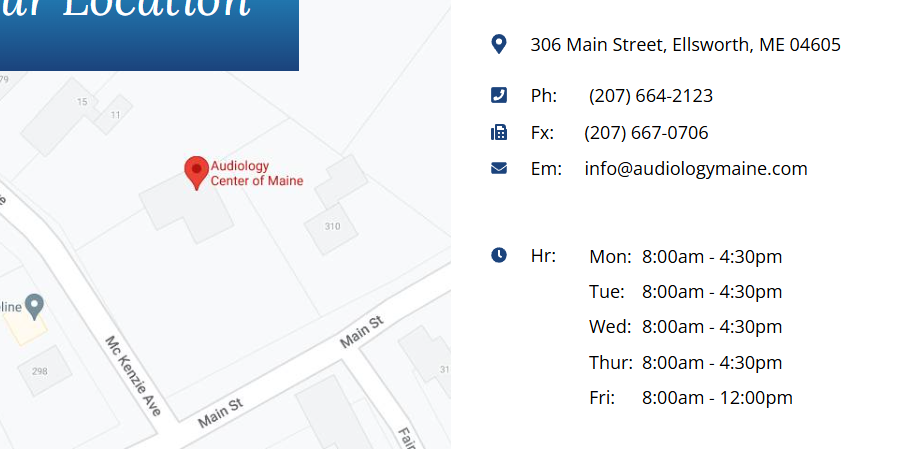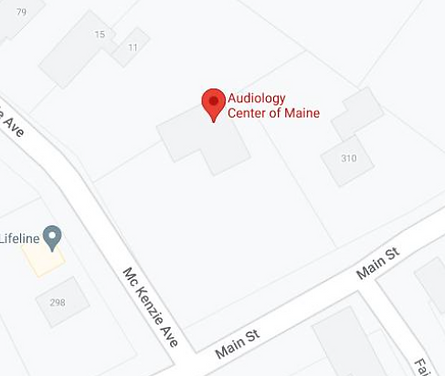Appointments are in extremely high demand. Please arrange your next visit as soon as possible. Call us today at (207) 664-2123

(207)664-2123

High Quality Care for High Quality Life
Maine's Premier Hearing & Balance Center

Welcome to the
Audiology Center of Maine
in Ellsworth!
We are a locally owned and operated audiology practice deeply rooted in our community. Our mission is to provide high-quality, personalized audiological care to help adults thrive at all stages of life.

The Audiology Center of Maine is uniquely positioned in the state as the only audiology practice offering comprehensive assessment and treatment for both hearing and balance concerns. We understand the significant impact ear and hearing disorders can have on a person's well-being and the critical importance of proper care.
When concerns are identified, we prioritize appropriate and affordable care, recognizing its paramount importance for successful outcomes. Patients can know that they’re receiving optimal care as we adhere to best practice protocols. Moreover, our innovative Membership Model of Care ensures affordability.
We also collaborate with other specialists to ensure patients receive comprehensive care. Our network includes physical therapists, speech-language pathologists, Ear, Nose, and Throat physicians, general practitioners, psychologists and neurologists. Additionally, we are affiliated with the American Institute of Balance, certified as Dementia Practitioners and clinically certified by the American Speech Language and Hearing Association.
At the Audiology Center of Maine, our goal is to provide compassionate, patient-centered care that meets the highest standards and guarantees satisfaction. We firmly believe in delivering high quality care for a high quality life.

Having Balance Issues?
A balance disorder is a condition marked by the symptoms of feeling unsteady or dizzy.

Struggling with Hearing Loss?
Not everybody who suffers from hearing loss is aware of their condition.

Interested in
Hearing Loss Treatment?
We offer more than just the world's best hearing aid technology to treat your hearing loss.



Our Location

Contact Us

OUR PRACTICE VALUES
At Audiology Center of Maine, our team practices audiology based on a set of core values, which provide a foundation for your hearing health care:
Compassion/Caring
We want to help you hear your best, every day. We understand that hearing care can often be worrisome for individuals, so we spend extra time and care to make sure you are comfortable with the care we provide you. We want to ensure you understand not just the test results, but also your different treatment options.
Integrity/Sincerity
Our goal is to bring you to optimal hearing health. After evaluation, our providers and audiology assistants will discuss treatment plans with you and select the option that best fits your hearing needs, both functionally and financially.
Pursuit of Perfection
Our team will work tirelessly to ensure your treatment meets top standards and that you are happy with the end result.
Desire of Knowledge
Our entire professional team is constantly attending continuing education courses to further hone their skills in existing audiological testing procedures and to learn more about cutting edge hearing aid technology that can benefit our patients in the future.

OUR SERVICES
Audiologic & Cognitive Assessments
Our unique ear-to-brain diagnostic studies will show us how you hear and process sounds and speech around you - not just in quiet, but also in more challenging listening environments. Click here to learn more.
Tinnitus Assessments
Tinnitus is not normal. If left untreated, it can significantly increase your risk of cognitive decline and dependence as you age. Fortunately, we can help. Click here to learn about Tinnitus Pitch Matching and Tinnitus Masking procedures.
Balance Function Assessments
We are Maine's Premier Neurodiagnostic Balance Center, and utilize a variety of state-of-the-art studies to help diagnose and treat your balance problem.
If you have symptoms of dizziness, lightheadedness, vertigo, or unsteadiness, click here to learn how we can help.
Hearing Loss Treatment
We fit only state-of-the-art prescriptive hearing aids using probe microphone verification procedures to ensure you get the right amount of clarity improvement for your hearing loss. Click here to learn more.
Tinnitus Treatments
The single-most effective treatment option available for patients suffering from tinnitus is prescriptive technology capable of stimulating the ear-to-brain neural connections. Click here to learn more.
Auditory Training
Hearing aids are only half of the solution to hearing better. Hearing aids amplify sound, but the brain is where you process and understand it. We help our patients learn to hear with their brain, not just their ears. Click here to learn more about LACE AI Pro.
Hearing Aid Servicing
Think your current hearing aid doesn't sound as good as it should? We recommend professional servicing by our specialists in our state-of-the-art Hearing Aid Lab. Call us today to learn how we can help.
Hearing Assistive Technology
Bluetooth Connectivity, Auracast, ROGER technology, Partner Microphones, TV Streamers, Caption Call Telephones, and more!
MEET OUR TEAM
Dr. David A. Jardine, Au.D.
Doctor of Audiology
Dr. David grew up in Minden, Nebraska. He completed a bachelor’s degree at Nebraska Wesleyan University, a master’s degree in psychology at University of Pacific in California and went on to earn his doctor of audiology degree at University of Louisville’s School of Medicine in Kentucky. As a student, Dr. David spent his clinic externship at the Louisville VA Medical Center, where he created a tinnitus rehabilitation clinic for disabled military veterans. Upon graduation, David was responsible for developing and growing the Hearing and Balance Center at the University of the Pacific in Stockton, California. David also spent time in the world of academia while at UoP, and he taught undergraduate level courses on the hearing sciences.
Dr. Elizabeth Beal Jardine, Au.D.
Doctor of Audiology
Dr. Elizabeth is a native Mainer. She grew up on Beals Island in Downeast Maine. Dr. Elizabeth completed her bachelor’s degree at University of Maine at Orono, and afterward she earned her Doctor of Audiology degree at Central Michigan University in Mt. Pleasant, Michigan. She did her clinical externship at Eastern Maine Medical Center’s The Hearing Center in Bangor. Upon graduation, Elizabeth worked at the University of the Pacific in Stockton, California where she taught speech language pathology graduate student courses on auditory processing disorders and also helped Dr. David start the UoP Balance Center. Later, Elizabeth also helped establish a new audiology clinic for Mercy Medical Group in Elk Grove.
Dr. David and Dr. Elizabeth met while attending a national audiology convention in Tucson, Arizona as students in 2004. After a short engagement, they were later married in Jonesport, Maine in 2005. After practicing for several years in California, the Jardines together spent the past six years developing and running a state-of-the-art audiology center at Central Maine Medical Center in Lewiston, Maine. In March of 2017, Dr. David and Dr. Elizabeth were invited to join audiologist Mary Toothaker, M.A. at the Audiology Center of Maine. They later acquired the practice on June 22, 2018.
Meredith Bishop
Practice Manager
Meredith has worked at the Audiology Center of Maine for almost 12 years. She has experience in both clinical office administration and hearing instrument troubleshooting and repairs. Meredith grew up in the Ellsworth area, and she enjoys spending time with her family.
Tynna Guyton
Patient Services Representative
Tynna joined the Audiology Center of Maine team in March of 2023. While new to the practice, Tynna has many years of experience in customer service and enjoys bringing a smile to people’s faces. Tynna grew up in the Hancock County area and enjoys spending time with her family, traveling, and working in her art shed on her uniquely designed tumblers.
OUR LOCATION




CONTACT US
Our Address
Hours of Operation
306 Main Street
Ellsworth, ME 04605
Tel: 207-664-2123 \\ Fax: 207-667-0706
Monday – Thursday 08:00AM – 04:30PM
Fridays 08:00 AM - 11:30 PM
Closed Saturday & Sunday
We accept cash, Visa, Mastercard, Discover, and American Express.
We participate with most healthcare insurances, including:
Medicare, Cigna, UnitedHealthcare, Martin's Point, Harvard Pilgrim Health Care, Anthem, Blue Cross Blue Shield, Aetna, Humana. We also accept Care Credit.
Please contact our office for more information.
We Are Proud Participants of the Following Charitable Programs:








